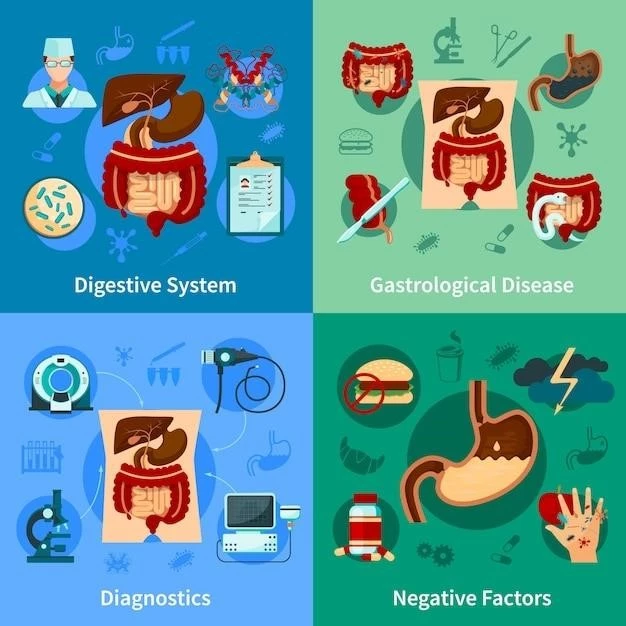Understanding Colorectal Cancer Symptoms
Treatment Options for Colorectal Cancer
Colorectal Cancer Prevention Strategies
Diet and Lifestyle Factors in Colorectal Health
Screening Guidelines for Colorectal Cancer
Advances in Colorectal Cancer Research
Living with Colorectal Cancer⁚ Tips and Support
Hereditary Factors in Colorectal Cancer
Overview of Colorectal Cancer
The overview of colorectal cancer includes the understanding of its development, risk factors, and incidence rates․ It provides essential insights into the progression of the disease and highlights the importance of early detection and prompt treatment․ Understanding the basics of colorectal cancer is crucial for effective management and improved patient outcomes․
Common Symptoms of Colorectal Cancer
Recognizing common symptoms of colorectal cancer is essential for early detection and timely intervention․ Symptoms such as changes in bowel habits, blood in stool, abdominal pain, and unexplained weight loss could indicate colorectal cancer․ Understanding these symptoms can prompt individuals to seek medical evaluation and potentially improve treatment outcomes․
Treatment Options for Colorectal Cancer
Surgical Interventions
Surgical interventions play a vital role in treating colorectal cancer․ Procedures such as colectomy, polypectomy, and laparoscopic surgery are commonly used to remove cancerous tissue․ Surgical options aim to remove the tumor and surrounding tissue to prevent cancer spread and improve patient outcomes․ Adjuvant surgery may also be recommended based on the cancer stage and individual patient factors․
Chemotherapy and Radiation Therapy
Chemotherapy and radiation therapy are essential components of colorectal cancer treatment․ Chemotherapy uses drugs to kill cancer cells or slow their growth, while radiation therapy uses high-energy rays to target and destroy cancer cells․ These treatment modalities may be used alone or in combination with surgery to improve outcomes and reduce the risk of cancer recurrence․

Colorectal Cancer Prevention Strategies
Healthy Diet and Nutrition
A healthy diet rich in fruits, vegetables, whole grains, and lean proteins can reduce the risk of colorectal cancer․ Consuming adequate fiber, limiting red meat and processed foods, and staying hydrated are key dietary factors․ Proper nutrition supports overall health and may help prevent the development of colorectal cancer․ Consult a healthcare provider for personalized dietary recommendations․
Regular Physical Activity
Engaging in regular physical activity is crucial in reducing the risk of colorectal cancer․ Exercise helps maintain a healthy weight, promotes digestion, and boosts overall well-being․ Aim for at least 150 minutes of moderate-intensity activity per week․ Consult with a healthcare provider before starting any exercise regimen, especially if you have existing health conditions․
Diet and Lifestyle Factors in Colorectal Health
The Role of Fiber in Colorectal Health
Fiber plays a crucial role in colorectal health by promoting healthy digestion and preventing constipation․ A diet high in fiber from fruits, vegetables, and whole grains can lower the risk of colorectal cancer․ Fiber also supports gut health and regulates bowel movements․ Incorporating fiber-rich foods into your diet is a simple way to improve colorectal health․
Effects of Alcohol and Smoking on Colorectal Cancer Risk
Alcohol consumption and smoking are significant risk factors for colorectal cancer․ Excessive alcohol intake and tobacco use can increase the likelihood of developing this type of cancer․ Limiting alcohol consumption and avoiding smoking are essential lifestyle choices to reduce the risk of colorectal cancer․ Consult with a healthcare provider for support in quitting smoking and managing alcohol consumption․
Screening Guidelines for Colorectal Cancer
Colonoscopy and Other Screening Modalities
Colonoscopy is a primary screening modality for colorectal cancer, allowing doctors to visualize the colon for abnormalities․ Other screening methods include fecal occult blood tests, sigmoidoscopy, and stool DNA tests․ Regular screenings help detect precancerous polyps or cancer at early stages when treatment is most effective․ Consult a healthcare provider for personalized screening recommendations․
When to Start Screenings and How Often
The recommended age to start colorectal cancer screenings is typically at 50 years old for average-risk individuals․ Screening frequency may vary depending on the method used and individual risk factors․ Factors such as family history and personal health may influence the screening schedule․ Discuss with a healthcare provider to determine the most appropriate screening plan for you․
Advances in Colorectal Cancer Research
Immunotherapy and Targeted Therapies
Immunotherapy and targeted therapies are promising advancements in colorectal cancer treatment․ Immunotherapy boosts the body’s immune system to fight cancer cells, while targeted therapies focus on specific molecular targets in cancer cells․ These innovative treatment approaches offer personalized and effective options for patients with advanced colorectal cancer․ Consult with healthcare providers about these cutting-edge treatment modalities․
Genetic Testing and Personalized Medicine
Genetic testing helps identify inherited gene mutations associated with colorectal cancer․ Personalized medicine utilizes genetic information to tailor treatment plans for individuals based on their unique genetic profile․ This approach enhances treatment effectiveness, minimizes side effects, and improves outcomes for patients with colorectal cancer․ Discuss genetic testing and personalized treatment options with your healthcare team․
Living with Colorectal Cancer⁚ Tips and Support
Managing Treatment Side Effects
Managing treatment side effects is crucial for individuals with colorectal cancer․ Strategies may include medication, lifestyle modifications, and supportive care to alleviate symptoms such as nausea, fatigue, and neuropathy․ Open communication with healthcare providers and adherence to treatment plans can help minimize side effects and improve quality of life during cancer therapy․
Support Groups and Counseling Services
Support groups and counseling services offer emotional and psychological support to individuals living with colorectal cancer․ Connecting with others facing similar challenges can provide a sense of community and understanding․ Professional counseling services can help individuals cope with stress, anxiety, and emotional issues related to their cancer diagnosis․ Seek out these resources for comprehensive support․
Hereditary Factors in Colorectal Cancer
Understanding Familial Adenomatous Polyposis and Lynch Syndrome
Familial Adenomatous Polyposis and Lynch Syndrome are hereditary conditions associated with an increased risk of colorectal cancer․ Understanding the genetic basis and inheritance patterns of these syndromes is crucial for early detection and intervention․ Individuals with a family history of these conditions may benefit from genetic counseling and screening to manage colorectal cancer risk effectively․
Genetic Counseling and Testing for Hereditary Colorectal Cancer
Genetic counseling and testing play a vital role in identifying hereditary colorectal cancer risks․ Individuals with a family history of the disease can benefit from understanding their genetic predisposition․ Genetic testing provides valuable information for personalized risk assessment and management strategies․ Consult with genetic counselors for comprehensive guidance on hereditary colorectal cancer screening and prevention․
